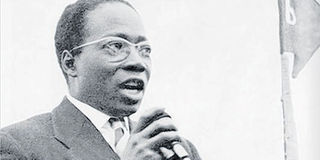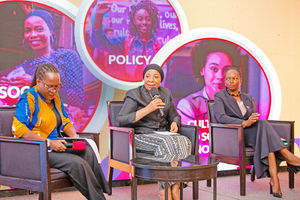The failed vision of a united Africa - Part IX

Léopold Sédar Senghor; the founding father of the Senegal. PHOTO | FILE
What you need to know:
- He was an academician who rose to the ranks of academia and became a professor and a member of the French Academy. He is regarded by many as one of most important African intellectuals of the 20th century.
Another forefather’s account of the pan-African movement of One Africa Vision, that we will narrate, is the story of Léopold Sédar Senghor; the founding father of the Senegal nation. Born on the 9th October 1906 in the city of Joal about 100 km south of Dakar.
He was an academician who rose to the ranks of academia and became a professor and a member of the French Academy. He is regarded by many as one of most important African intellectuals of the 20th century.
He studied in the Ngasobil boarding school of the Catholic Fathers of the Holy Spirit in Senegal and entered a seminary in Dakar in 1922 for anticipation of becoming a priest. He was later rejected for a priesthood life and he then attended government schools to complete his education.
After accomplishing his secondary school he was awarded a scholarship and in 1928 Senghor went to France, for his post-secondary studies at the Sorbonne University in Paris (Sorbonne Université) a prestigious university in Paris.
From 1935 Senghor also studied at the École pratique des hautes études and École normale supérieure; also prestigious universities in France. At École normale supérieure he met other important intellectuals of the francophone world including Georges Pompidou who became Prime Minister of France from 1962 to 1968 and later became President of the Republic of France from 1969 until 1974.
After graduating with a Degree in French Grammar; he then took a teaching career as a professor at the University of Lycée René-Descartes of Tours and Paris. He also taught at the Lycée Marcelin-Berthelot University in Saint-Maur-des-Fosses near Paris.
Due to the prevalent racism in France at that time he coined and conceived the concept of “négritude”. The idea that not only highlighted Senghor’s cultural criticism and literature work, it also became a guiding principle for his political thought in his career as a nationalist and pan-African leader of the Senegalese nation.
After becoming a French national in 1939, Senghor was enrolled in the French army with the rank of private in the 59th Colonial Infantry Division. In 1940, during the German invasion of France, he was captured and taken prisoner by the Germans in la Charité-sur-Loire.
When the German soldiers wanted to execute him and his colleague, they yelled at the soldiers Vive la France, vive l’Afrique noire! – meaning “long live France, long live Black Africa!”.
They were spared because the Germany soldiers felt that executing the African prisoners would dishonour the Aryan race (a racial grouping describing people of European and Western Asian heritage) and the German Army. Senghor spent two years in different prison camps, where he started writing poems.
When the war was over, Senghor resumed his teaching career and was selected as Dean of the Faculty of Linguistics at the University of École nationale de la France d’Outre-Mer, a position he would hold until Senegal’s independence in 1960.
Senghor travelled home to Senegal on a research trip for his poetry, he met the local socialist leader, Lamine Guèye, who suggested that Senghor run for election to become a member of the National Assembly (Assemblée nationale française).
Senghor accepted and was elected member of the Assemblée Nationale Française. He then became a Deputy Secretary in the Senegal French Colony Government responsible for Sénégal-Mauritanie. Later Guèye and Senghor fell apart on a workers strike.
While Guèye opposed the movement arguing the movement would paralyse the colony; Senghor supported the workers, and this gave him great support and recognition among Senegalese.
In 1951 while Guèye lost the election; Due to his pan-African touch to the people; Senghor was re-elected as an independent overseas member, and appointed State Secretary to the Edgar Faure Council Government. He served in that post from 1st March 1955 to 1st February 1956.




